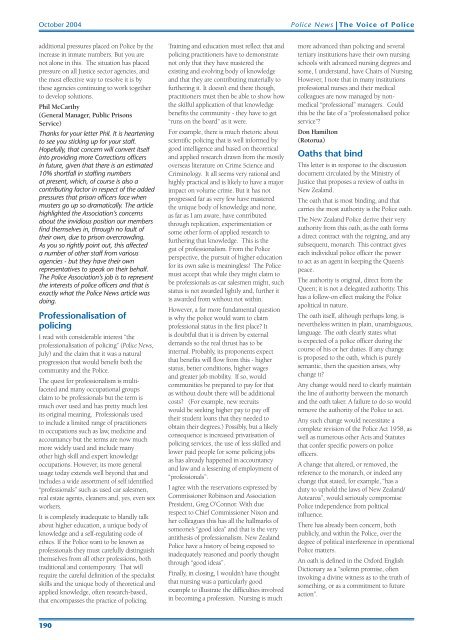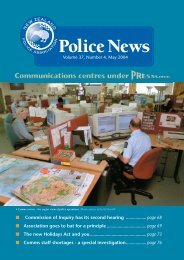Police News Oct.indd - New Zealand Police Association
Police News Oct.indd - New Zealand Police Association
Police News Oct.indd - New Zealand Police Association
You also want an ePaper? Increase the reach of your titles
YUMPU automatically turns print PDFs into web optimized ePapers that Google loves.
<strong>Oct</strong>ober 2004<strong>Police</strong> <strong><strong>New</strong>s</strong> The Voice of <strong>Police</strong>additional pressures placed on <strong>Police</strong> by theincrease in inmate numbers. But you arenot alone in this. The situation has placedpressure on all Justice sector agencies, andthe most effective way to resolve it is bythese agencies continuing to work togetherto develop solutions.Phil McCarthy(General Manager, Public PrisonsService)Thanks for your letter Phil. It is hearteningto see you sticking up for your staff.Hopefully, that concern will convert itselfinto providing more Corrections officersin future, given that there is an estimated10% shortfall in staffing numbersat present, which, of course is also acontributing factor in respect of the addedpressures that prison officers face whenmusters go up so dramatically. The articlehighlighted the <strong>Association</strong>’s concernsabout the invidious position our membersfind themselves in, through no fault oftheir own, due to prison overcrowding.As you so rightly point out, this affecteda number of other staff from variousagencies - but they have their ownrepresentatives to speak on their behalf.The <strong>Police</strong> <strong>Association</strong>’s job is to representthe interests of police officers and that isexactly what the <strong>Police</strong> <strong><strong>New</strong>s</strong> article wasdoing.Professionalisation ofpolicingI read with considerable interest “theprofessionalisation of policing” (<strong>Police</strong> <strong><strong>New</strong>s</strong>,July) and the claim that it was a naturalprogression that would benefit both thecommunity and the <strong>Police</strong>.The quest for professionalism is multifacetedand many occupational groupsclaim to be professionals but the term ismuch over used and has pretty much lostits original meaning. Professionals usedto include a limited range of practitionersin occupations such as law, medicine andaccountancy but the terms are now muchmore widely used and include manyother high skill and expert knowledgeoccupations. However, its more generalusage today extends well beyond that andincludes a wide assortment of self identified“professionals” such as used car salesmen,real estate agents, cleaners and, yes, even sexworkers.It is completely inadequate to blandly talkabout higher education, a unique body ofknowledge and a self-regulating code ofethics. If the <strong>Police</strong> want to be known asprofessionals they must carefully distinguishthemselves from all other professions, bothtraditional and contemporary. That willrequire the careful definition of the specialistskills and the unique body of theoretical andapplied knowledge, often research-based,that encompasses the practice of policing.Training and education must reflect that andpolicing practitioners have to demonstratenot only that they have mastered theexisting and evolving body of knowledgeand that they are contributing materially tofurthering it. It doesn’t end there though,practitioners must then be able to show howthe skilful application of that knowledgebenefits the community - they have to get“runs on the board” as it were.For example, there is much rhetoric aboutscientific policing that is well informed bygood intelligence and based on theoreticaland applied research drawn from the mostlyoverseas literature on Crime Science andCriminology. It all seems very rational andhighly practical and is likely to have a majorimpact on volume crime. But it has notprogressed far as very few have masteredthe unique body of knowledge and none,as far as I am aware, have contributedthrough replication, experimentation orsome other form of applied research tofurthering that knowledge. This is thegut of professionalism. From the <strong>Police</strong>perspective, the pursuit of higher educationfor its own sake is meaningless! The <strong>Police</strong>must accept that while they might claim tobe professionals as car salesmen might, suchstatus is not awarded lightly and, further itis awarded from without not within.However, a far more fundamental questionis why the police would want to claimprofessional status in the first place? Itis doubtful that it is driven by externaldemands so the real thrust has to beinternal. Probably, its proponents expectthat benefits will flow from this - higherstatus, better conditions, higher wagesand greater job mobility. If so, wouldcommunities be prepared to pay for thatas without doubt there will be additionalcosts? (For example, new recruitswould be seeking higher pay to pay offtheir student loans that they needed toobtain their degrees.) Possibly, but a likelyconsequence is increased privatisation ofpolicing services, the use of less skilled andlower paid people for some policing jobsas has already happened in accountancyand law and a lessening of employment of“professionals”.I agree with the reservations expressed byCommissioner Robinson and <strong>Association</strong>President, Greg O’Connor. With duerespect to Chief Commissioner Nixon andher colleagues this has all the hallmarks ofsomeone’s “good idea” and that is the veryantithesis of professionalism. <strong>New</strong> <strong>Zealand</strong><strong>Police</strong> have a history of being exposed toinadequately reasoned and poorly thoughtthrough “good ideas”.Finally, in closing, I wouldn’t have thoughtthat nursing was a particularly goodexample to illustrate the difficulties involvedin becoming a profession. Nursing is muchmore advanced than policing and severaltertiary institutions have their own nursingschools with advanced nursing degrees andsome, I understand, have Chairs of Nursing.However, I note that in many institutionsprofessional nurses and their medicalcolleagues are now managed by nonmedical“professional” managers. Couldthis be the fate of a “professionalised policeservice”?Don Hamilton(Rotorua)Oaths that bindThis letter is in response to the discussiondocument circulated by the Ministry ofJustice that proposes a review of oaths in<strong>New</strong> <strong>Zealand</strong>.The oath that is most binding, and thatcarries the most authority is the <strong>Police</strong> oath.The <strong>New</strong> <strong>Zealand</strong> <strong>Police</strong> derive their veryauthority from this oath, as the oath formsa direct contract with the reigning, and anysubsequent, monarch. This contract giveseach individual police officer the powerto act as an agent in keeping the Queen’speace.The authority is original, direct from theQueen; it is not a delegated authority. Thishas a follow-on effect making the <strong>Police</strong>apolitical in nature.The oath itself, although perhaps long, isnevertheless written in plain, unambiguous,language. The oath clearly states whatis expected of a police officer during thecourse of his or her duties. If any changeis proposed to the oath, which is purelysemantic, then the question arises, whychange it?Any change would need to clearly maintainthe line of authority between the monarchand the oath taker. A failure to do so wouldremove the authority of the <strong>Police</strong> to act.Any such change would necessitate acomplete revision of the <strong>Police</strong> Act 1958, aswell as numerous other Acts and Statutesthat confer specific powers on policeofficers.A change that altered, or removed, thereference to the monarch, or indeed anychange that stated, for example, “has aduty to uphold the laws of <strong>New</strong> <strong>Zealand</strong>/Aotearoa”, would seriously compromise<strong>Police</strong> independence from politicalinfluence.There has already been concern, bothpublicly, and within the <strong>Police</strong>, over thedegree of political interference in operational<strong>Police</strong> matters.An oath is defined in the Oxford EnglishDictionary as a “solemn promise, ofteninvoking a divine witness as to the truth ofsomething, or as a commitment to futureaction”.190

















